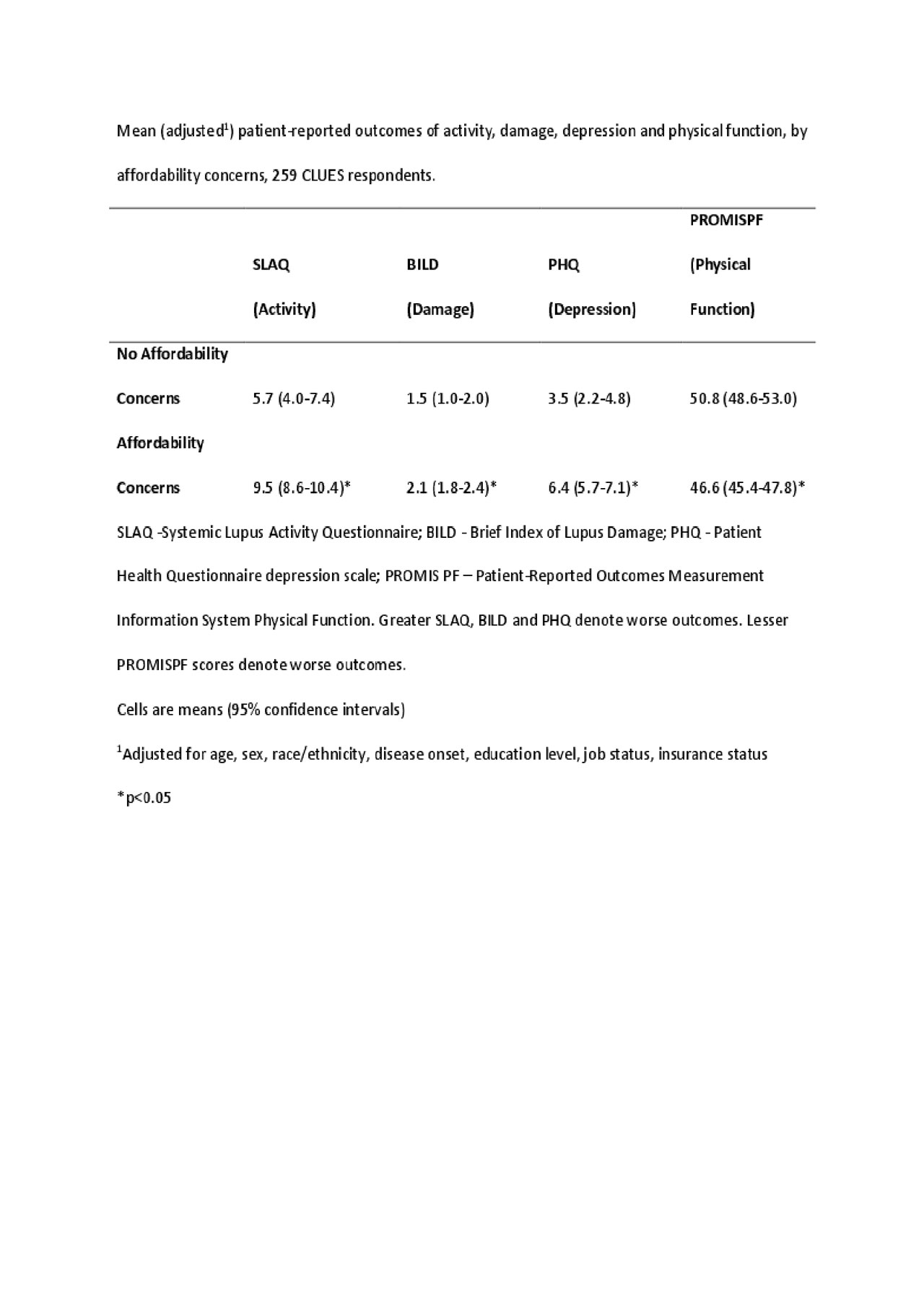Session Information
Session Type: Poster Session (Sunday)
Session Time: 9:00AM-11:00AM
Background/Purpose: Among rheumatologic conditions, SLE is associated with very high healthcare and out of pocket costs. Little is known about patients’ concerns regarding costs of care. We analyzed patterns of patient perceptions of affordability of care and medication costs and explored associations with disease measures in SLE.
Methods: Data derive from the California Lupus Epidemiology Study (CLUES), a diverse population-based cohort of individuals with SLE. As part of an extensive interview, 259 participants answered 2 questions about affordability of care (at diagnosis [recalled] and at present) and 6 questions about medication costs (Is paying for your lupus medicines financially difficult?; Have you ever: taken less medicine; delayed filling a prescription; asked about lower cost medicine; bought medicine out of the country; applied for patient assistance program?). These 8 items were combined to describe “affordability concerns.” We compared prevalence of affordability concerns by race/ethnicity and socioeconomic status and examined associations with patient reported measures in linear regression models [with and without adjustment for age, gender, age of diagnosis, race/ethnicity, income below poverty, education (no bachelor’s degree vs bachelor’s), insurance (private vs public) and employment].
Results: Concern about affordability of care at diagnosis (56%) and at present (53%) were greater than concerns about medication costs (25%). Most patients with SLE (77% of 259 respondents) reported at least one affordability concern. There were no differences in affordability concerns by race/ethnicity, either at diagnosis or at present. Affordability concerns were most prevalent among those with public insurance (83% vs 70%, p< 0.01), an education below a college degree (88% vs 66%, p< 0.01) and income below the poverty level (98% vs 70%, p< 0.01). Individuals with affordability concerns had worse patient-reported scores of disease activity, damage, depression and physical function than non-concerned peers, even controlling for sociodemographic factors (Table).
Conclusion: Most people with SLE are concerned about cost of treatment among individuals with SLE both at diagnosis and over time. Concern about affordability is associated with poorer patient-reported outcomes. Our findings support strategies to proactively assess affordability concerns and develop resources that focus on mitigating cost of care for this population.

Table DeQuattro Affordability concerns prevalent among patients with systemic lupus erythematosus 5.23.19
To cite this abstract in AMA style:
DeQuattro K, Trupin L, Katz P, Rush S, Murphy L, Dall'Era M, Yazdany J. Affordability Concerns Prevalent Among Patients with Systemic Lupus Erythematosus (SLE) [abstract]. Arthritis Rheumatol. 2019; 71 (suppl 10). https://acrabstracts.org/abstract/affordability-concerns-prevalent-among-patients-with-systemic-lupus-erythematosus-sle/. Accessed .« Back to 2019 ACR/ARP Annual Meeting
ACR Meeting Abstracts - https://acrabstracts.org/abstract/affordability-concerns-prevalent-among-patients-with-systemic-lupus-erythematosus-sle/
